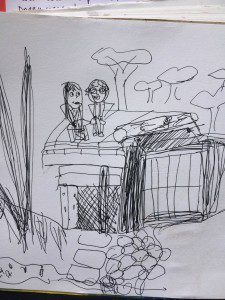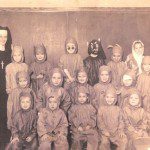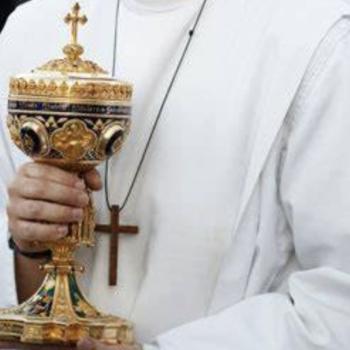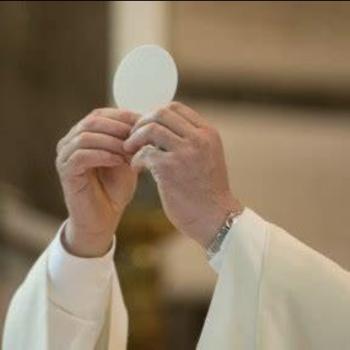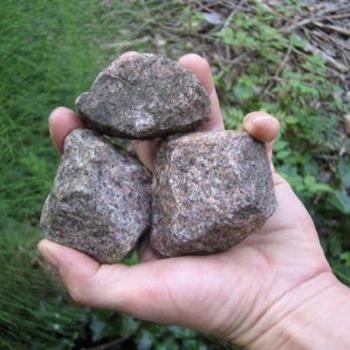When men see Han-shan
They all say he’s crazyAnd not much to look at
Dressed in rags and hides.
They don’t get what I say
& I don’t talk their language.
All I can say to those I meet:
“Try and make it to Cold Mountain.”
Nobody really knows who Han-shan was or exactly when he lived or died, but some time in the 9th century, he wrote several hundred poems that survived him, somehow, though he sometimes wrote them on rocks. He was poor, crazy, he walked around talking to himself, clapping his hands and laughing. “Yet in every word he breathed was a meaning in line with the subtle principle of things,” wrote Gary Snyder in the introduction to his translation of Han-shan’s poems. In other words, he was a holy fool–one who feigns madness out of humility, or seems mad to others but is really quite sane, or maybe he is truly mad but also possesses and imparts deep spiritual wisdom.
Oh, and Han-shan means Cold Mountain; he takes the name of his home.
I learned all this while my daughter and I had breakfast with our friend, poet Michael Delp, at his lodge on the Boardman River in Northern Michigan, because while I was eating my pancakes Charlotte brought me a waterlogged copy of Han-shan’s poems. I flipped through it and read the brief introduction and the poem I included above, and thought immediately of Delp’s Deck Sentences, short missives on the desire for transcendence that he posts daily on Facebook–more ephemeral than Han-shan’s rocks (Many of us who follow the Deck Sentences have urged Delp to collect them in a more permanent, accessible form, but he says he likes that they disappear into the ether.) Delp’s Deck Sentences are two long phrases joined by an ellipses, and in that ellipses is the distance between what we wish to be and what is. Delp wants to close that distance. Who doesn’t? But he gets a little closer than most here, the place we refer to simply as The River.
Here’s a Deck Sentence Delp wrote and shared on August 15, the Solemnity of the Assumption of Mary:
Today’s reading opens up a vision where I watch my ancient soul being passed between Immortals, held in each of their hands, the murmur of a a primal language let loose in my veins, still trying to surface in this life, become an act of alchemy where water turns into words…which trail to hike, the ridge or the creek, one leads to a view of open sky, the other to a place where water seeps from the side of a hill, that one spot of all locations where the old ones came to drink, speaking their words into the sky where they came to life as soul birds, flew off to roost in our hearts.
Delp isn’t Catholic. He’s a lapsed Methodist drawn to Eastern traditions, and maybe half a pagan too, and I know he’s not much for symbolism. So this Assumption Day meditation on an ancient soul passed between immortals–which alludes to the dormition of the theotokos, the Greek icon of Jesus holding his mother’s tiny soul–made me wonder, what is it about Catholicism that captivates him? I also wanted to know why he listens to Fulton Sheen, the old archbishop who pioneered televangelism in the 1950s with his show Life is Worth Living, on EWTN radio when he drives. Here’s what he told me while we sat drinking coffee on The Deck, watching The River.

MD: I remember watching Fulton Sheen on TV as a kid…his gaunt appearance, his vestments. This was before those evangelical guys had even made a dent. He had this innate sense of holiness, though he was very theatrical, even overwrought. He seemed to me like the kind of person who could live without food. He always used this phrase, the Mystical Body of Christ, which transfixed me. In the Methodist church where I was raised, there is no body on the cross. Jesus looked like Jeffrey Hunter.
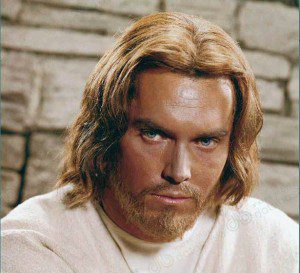
The way he was depicted in the art I saw in our church, he was always among the people, helping the poor, tending the sick. But when I heard Sheen, I thought of Jesus as a vapor, everywhere, he moves in and out of things, he appears as a mystical event. You can see him, but you can’t see him. As soon as you think you see him, he’s gone. Now when I think of Jesus I think of him riding into Jerusalem, wild-eyed, the embodiment of the universe in human form. Jesus contains everything. When Sheen talks about the Mystical Body that’s what I imagine, that force, that presence that he can always tap into. It’s like he’s getting transmissions from God on a ticker tape.
In the Methodist church, it was always practical. The directive was always to take the Bible and put it into practice, to do what you can for someone else. That’s the ethic of Christianity I was brought up with–you help the poor. But there was something missing. It was mysticism. This idea that when you approach the mystical power, you become less and it grows. You get close enough and then at some point, you have to yield. I always wanted to get closer to that energy, even as a child. That’s why I turned away from Christianity and toward Eastern religion, to people like Han-shan and Gary Snyder.
*At this point in the conversation a muskrat swims by us with an apple in its mouth*
JMG: What the hell was that?
JMG: So that’s how I think of the Eucharist, as the great energy source. When I take communion I’m coming into direct physical contact with The Mystery.
MD: When I take communion, I think, this is a cracker.
JMG: Well, it is a cracker. You’re Methodist. But for Catholics it’s flesh and blood, it’s Jesus and every soul that rests in him too, and all of time and eternity. And we eat it, take it into our bodies. It’s bread, and it’s also everything.
MD: I think of the Eucharist as ever present. It’s elemental. It’s in the air, in the water, in the power of this place. It converges here. (He points to where the feeder creek bubbles into the Boardman. It is a magical spot, something out of Tolkien, where you’d expect to find Tom Bombadil.) Once I stood here and I had this overwhelming sense, I just knew, with my whole being, what it was like to be a river. I still have the residual sense of it, the memory.
MD: But the river doesn’t require the same kind of leap of faith. It’s here, I can see it. IT BE. It exists. It’s alive. I don’t have to extrapolate.
JMG: But what about for someone like me, who has been separated from her home, the land she loves, the place she feels connected? I know that’s another reason I’m Catholic, and why I love to take communion as a Catholic–it spans time and space so that everything lost is returned to me in that moment, for a moment.
MD: It IS in me. I’ve made a practice my whole life of cataloguing the places I love so they are within, and I can go there any time. That’s how I survived years of faculty meetings. The rivers are inside me. This is the literal transformation of the Eucharist. This is the union with the divine that I seek. This place, for me, is where the gap gets closed.
Michael Delp is the former Director of Creative Writing at Interlochen Arts Academy. He has published several volumes of prose and poetry through Wayne State University Press, and is currently the co-editor of their ‘“Made in Michigan” book series, which is in its tenth year of award-winning publication. He is also the mentor/advisor for the National Writer’s Series Front Street Writers Program in Traverse City, MI. His most current work is Lying in the River’s Dark Bed: The Confluence of the Deadman Poems and the Mad Angler Poems, published by Wayne State University Press (2016). He spends most of his time fly fishing on the Boardman River and lives on Green Lake with his wife, Claudia.
Jessica Mesman Griffith is the co-founder of Sick Pilgrim, the author of Love and Salt, and a native of southern Louisiana living, or trying to, in Northern Michigan.


